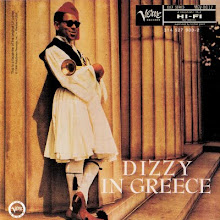The Jazztet was the brainchild of tenor saxophonist Benny Golson (b. 1929) and trumpet player Art Farmer (1928-1999). This stellar hard bop sextet lasted for 3 years (1959-62) being as influential as Art Blakey's Jazz Messengers at the time. The year is now 1997 and its founding members reunited for a concert in Salzau, Gernamy in the company of such giants as Milt Jackson on vibes, Niels Henning Oersted Pedersen on bass, Kenny Kirkland on piano, the ever - present Ulf Wakenius on guitar and Jonas Johansen on drums of which the first three are sadly no longer with us. First number is a classic Milt "Bags" Jackson hard bop blues, Blues For Diahann.
Next number, Thinking Of You, a beautiful ballad originally included in the 1958 Milt Jackson masterpiece Bag's Opus with Benny Golson, Art Farmer, Connie Kay, Paul Chambers and Tommy Flanagan. Here Bags and Art Farmer really shine in his patented flumpet, a trumpet - flugelhorn hybrid.
This is Benny Golson's masterpiece (and one of my personal favorites) Whisper Not, originally recorded when Benny was a member and main composer of the Art Blakey's Jazz Messengers.
This is I Remember Clifford, another Benny Golson masterpiece dedicated to the great late trumpet player Clifford Brown, originally recorded when Benny was a member and main composer of the Art Blakey's Jazz Messengers, which Bags and Benny Golson make, well ...their own.
It's time for Benny Golson to summon to the bandstand the great late pianist Kenny Kirkland to contribute with his magnificent talent to the classic Milt Jackson hard bop blues SKJ written for the lucky Mrs Jackson.
This is Afternoon In Paris, a cool jazz composition by John Lewis who was the piano player and co-leader with Milt Jackson of the Modern Jazz Quartet, the famous jazz outfit that flirted with classical forms.
This is Bag's Groove, Milt Jackson's archetypal hard bop blues and perhaps his signature composition with surprise guests master harmonica player Toots Thielemans and drums genius Max Roach.
Sol Schlinger, Baritone Sax Extraordinaire
1 year ago


